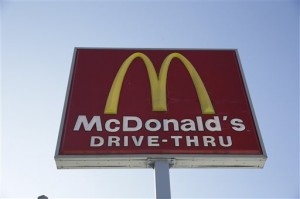McDonald’s Corp, the world’s largest fast-food chain, is to close 350 stores globally, including 220 in China and the United States.
The company said the move is in reaction to an 8.3 percent slump in first-quarter comparable sales in the Asia Pacific, the Middle East and Africa, which it blamed on the impact of what itcalled prolonged, broad-based consumer perception issues in Japan, and negative but improving performance in China.
Global comparable sales dropped 2.3 percent, reflecting negative customer traffic in all major segments, resulting in a 28 percent slide in the company’s overall consolidated operatingincome.
During the quarter, its operating income from the Asia Pacific, the Middle East and Africa declined 80 percent due to strategic restaurant closings and other charges, on top of the issues in Japan and China, it said.
The fast-food restaurant company is expecting 130 stores to close in Japan, but it did not respond to China Daily’s inquiry on the specific number of stores being shuttered in China.
Kevin Ozan, McDonald’s chief financial officer, said that April’s global comparable sales are also “expected to be negative”.
McDonald’s is considered the world’s leading global food service retailer with over 36,000 locations. More than 80 percent of those are owned and operated as independent businesses.
Yum Brands Inc, the parent company of Taco Bell, KFC and Pizza Hut, is also still struggling in China, where sales declined 6 percent in the first quarter, while same-store sales fell 12 percent.
The result was an improvement over the 16 percent same-store sales decline in the last quarter of 2014, and the company still insists it plans to add at least 700 new stores in China.
Analysts said customers in China have been slow to forget recent food scandals, one of which involved a major supplier of meat to fast-food companies including McDonald’s and Yum, which was shut down for allegedly violating numerous safety regulations, including mixing in chicken and beef parts that were well beyond their expiration date.
Yum has launched several initiatives to attract more customers in China including a high-end restaurant Atto Primo in Shanghai, and providing quality coffee in 1,300 restaurants across 10 cities.
Ben Cavender, principal of the Shanghai-based China Market Research, said he expected both brands to continue to struggle in China and internationally.
“This is due to changing consumer tastes and an overall shift toward either more healthy foods or niche brands,” said Cavender.
He said in China specifically both brands continue to feel the effects of the scandal, and a slowing economy, and any company running a huge number of stores might be faced with having to close some.
“Coffee sales may be boosting KFC a little bit,” he said, “but I don’t think they have it fully implemented yet and they also have a lot of competition in that space.”
RELATED STORIES:
Why McDonald’s is still a powerhouse, despite troubles
Russia closes 12 McDonald’s branches, inspects 100


